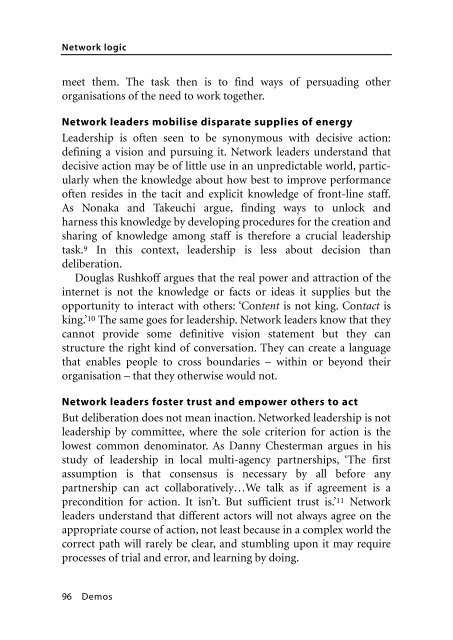Network Logic - Index of
Network Logic - Index of
Network Logic - Index of
Create successful ePaper yourself
Turn your PDF publications into a flip-book with our unique Google optimized e-Paper software.
<strong>Network</strong> logic<br />
meet them. The task then is to find ways <strong>of</strong> persuading other<br />
organisations <strong>of</strong> the need to work together.<br />
<strong>Network</strong> leaders mobilise disparate supplies <strong>of</strong> energy<br />
Leadership is <strong>of</strong>ten seen to be synonymous with decisive action:<br />
defining a vision and pursuing it. <strong>Network</strong> leaders understand that<br />
decisive action may be <strong>of</strong> little use in an unpredictable world, particularly<br />
when the knowledge about how best to improve performance<br />
<strong>of</strong>ten resides in the tacit and explicit knowledge <strong>of</strong> front-line staff.<br />
As Nonaka and Takeuchi argue, finding ways to unlock and<br />
harness this knowledge by developing procedures for the creation and<br />
sharing <strong>of</strong> knowledge among staff is therefore a crucial leadership<br />
task. 9 In this context, leadership is less about decision than<br />
deliberation.<br />
Douglas Rushk<strong>of</strong>f argues that the real power and attraction <strong>of</strong> the<br />
internet is not the knowledge or facts or ideas it supplies but the<br />
opportunity to interact with others: ‘Content is not king. Contact is<br />
king.’ 10 The same goes for leadership. <strong>Network</strong> leaders know that they<br />
cannot provide some definitive vision statement but they can<br />
structure the right kind <strong>of</strong> conversation. They can create a language<br />
that enables people to cross boundaries – within or beyond their<br />
organisation – that they otherwise would not.<br />
<strong>Network</strong> leaders foster trust and empower others to act<br />
But deliberation does not mean inaction. <strong>Network</strong>ed leadership is not<br />
leadership by committee, where the sole criterion for action is the<br />
lowest common denominator. As Danny Chesterman argues in his<br />
study <strong>of</strong> leadership in local multi-agency partnerships, ‘The first<br />
assumption is that consensus is necessary by all before any<br />
partnership can act collaboratively…We talk as if agreement is a<br />
precondition for action. It isn’t. But sufficient trust is.’ 11 <strong>Network</strong><br />
leaders understand that different actors will not always agree on the<br />
appropriate course <strong>of</strong> action, not least because in a complex world the<br />
correct path will rarely be clear, and stumbling upon it may require<br />
processes <strong>of</strong> trial and error, and learning by doing.<br />
96 Demos
















